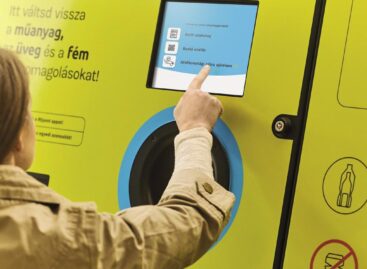One of the goals of MOHU is to further increase the return rate of beverage bottles
Former President János Áder also spoke with Zsolt Pethő, CEO of MOHU MOL Waste Management Zrt., about the first year of the new return system for beverage bottles in the latest episode of his Blue Planet podcast, which was published on Monday and is also available on the YouTube video sharing portal.
 The chairman of the board of trustees of the Blue Planet Climate Protection Foundation recalled that the return system for beverage bottles, PET bottles and aluminum cans was introduced a year ago. He reminded that the EU obliges member states – including Hungary – to process and recycle as much waste as possible. For example, within ten years, 65 percent of municipal waste must be recycled, he drew attention to this.
The chairman of the board of trustees of the Blue Planet Climate Protection Foundation recalled that the return system for beverage bottles, PET bottles and aluminum cans was introduced a year ago. He reminded that the EU obliges member states – including Hungary – to process and recycle as much waste as possible. For example, within ten years, 65 percent of municipal waste must be recycled, he drew attention to this.
Zsolt Pethő said: the reception of the new system by people was beyond expectations, as in the case of the aforementioned packaging materials, 6-7 million pieces are returned per day, and after holidays, more than 10 million pieces per day. According to experience so far, four out of five packaging materials are returned. In the case of PET bottles, the collection rate is over ninety percent
– he added.
The initial disruptions have now largely passed, and the approximately 3,000 available bottle return machines are operating at a rate of over 95 percent, while 1,700 manual return points are also available.
The CEO noted that the EU recycling rate set for waste recovery has already been achieved in Germany and the Scandinavian countries, which he believes Hungary can also meet, although this still requires a lot of development and people’s awareness.
János Áder also asked Zsolt Pethő about his experiences and plans regarding the collection of used cooking oil, recalling that a door-to-door oil collection system had already been introduced in Kaposvár. The CEO drew attention to the fact that a very significant portion of cooking oil still ends up in the sewers, even though it can cause serious pollution in the sewage system and the soil, and moreover, high-quality biodiesel fuel can be produced from it.
Related news
MOHU: 5,200 return points are in operation, but 47 larger settlements still do not have RE points – public “enema” machines may be introduced
🎧 Hallgasd a cikket: Lejátszás Szünet Folytatás Leállítás Nyelv: Auto…
Read more >Related news
GDP growth in OECD member countries slowed to 0.3 percent in the last quarter of last year
🎧 Hallgasd a cikket: Lejátszás Szünet Folytatás Leállítás Nyelv: Auto…
Read more >






